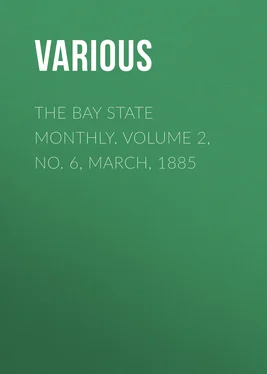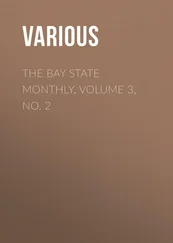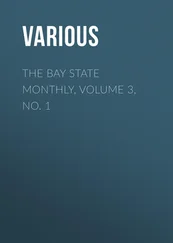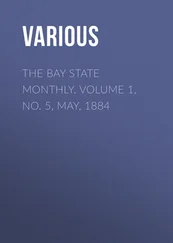Various - The Bay State Monthly. Volume 2, No. 6, March, 1885
Здесь есть возможность читать онлайн «Various - The Bay State Monthly. Volume 2, No. 6, March, 1885» — ознакомительный отрывок электронной книги совершенно бесплатно, а после прочтения отрывка купить полную версию. В некоторых случаях можно слушать аудио, скачать через торрент в формате fb2 и присутствует краткое содержание. Жанр: foreign_antique, periodic, foreign_edu, на английском языке. Описание произведения, (предисловие) а так же отзывы посетителей доступны на портале библиотеки ЛибКат.
- Название:The Bay State Monthly. Volume 2, No. 6, March, 1885
- Автор:
- Жанр:
- Год:неизвестен
- ISBN:нет данных
- Рейтинг книги:3 / 5. Голосов: 1
-
Избранное:Добавить в избранное
- Отзывы:
-
Ваша оценка:
- 60
- 1
- 2
- 3
- 4
- 5
The Bay State Monthly. Volume 2, No. 6, March, 1885: краткое содержание, описание и аннотация
Предлагаем к чтению аннотацию, описание, краткое содержание или предисловие (зависит от того, что написал сам автор книги «The Bay State Monthly. Volume 2, No. 6, March, 1885»). Если вы не нашли необходимую информацию о книге — напишите в комментариях, мы постараемся отыскать её.
The Bay State Monthly. Volume 2, No. 6, March, 1885 — читать онлайн ознакомительный отрывок
Ниже представлен текст книги, разбитый по страницам. Система сохранения места последней прочитанной страницы, позволяет с удобством читать онлайн бесплатно книгу «The Bay State Monthly. Volume 2, No. 6, March, 1885», без необходимости каждый раз заново искать на чём Вы остановились. Поставьте закладку, и сможете в любой момент перейти на страницу, на которой закончили чтение.
Интервал:
Закладка:
An attempt to describe the hall as it appeared on this occasion cannot be otherwise than unsatisfactory. To appreciate the brilliant scene one must see not only the gay decorations and the beautiful flowers and plants, but also the happy people and the elegant and tasty dresses of the ladies, in the full light of the extra burners placed in the centre of the hall for this reception.
The entire floor was carpeted, and the hall was divided into two sections—reception room and dining room—by pink and white bunting. The walls of the entire hall were decorated with draperies, cottons, pink and white buntings, etc., and festooned with two thousand yards of laurel and hanging baskets of flowers, while a splendid collection of pot plants, orange and lemon trees, and growing grapes, from Mr. Wallace's private conservatory added much to the grand effect of the designs.
The most elaborate work was in the front of the stage, at the right of the stage and on the right and left centres of the hall. Above all, over the stage was a gilt carved eagle surmounting the State coat of arms. On either side flags were festooned and ornamented with sprays of holly. In the rear of the platform were palm trees, while in front dracinas, and laurel, with a beautiful orange tree in each corner, each bearing nearly twenty oranges. On the right wall of the hall, the draperies were surmounted by four medallions representing the elements—Air, Earth, Fire, and Water. In the right centre was the large painting representing Crete, above which was the motto "Amicus inter Amicos." In the foreground was a pedestal surmounted by a bust of Ariadne, flanked on each side by growing grapes, with two Roman altars burning incense through the entire evening.
On the left centre wall was a large painting representing Antium, the home of Nero and Temple of Fortuna, with the Appollo Belvidere on a pedestal in the foreground, flanked with two standing vases with burning incense. Above the painting was the motto "Gaudeamus Igitur," resting on a gilt lyre and torch. Medallions representing Spring, Summer, Autumn, and Winter surmounted the draperies on this side of the hall.
One of the most admired features of the decorations was the design on the floor at the right of the stage. A pedestal, some ten feet high, was surmounted by a beautiful specimen of the American eagle. On either side of the eagle was a perfect flag made of natural flowers—violets, carnations and tube roses—with a shield of similar flowers in the centre. The entire pedestal was banked by pots of growing plants—including palms, dracinas, ponisettas in full bloom, etc.
The dining room was also handsomely decorated with flags, draperies and flowers, while the table itself was elegantly laid with exquisitely decorated china and silver, and ornamented by beautiful bouquets, candelabra, and epergnes. Supper was served through the entire evening, guests entering at the right from the reception apartment and passing through to the west side of the hall."
The completeness of all these arrangements were largely due to the taste and energy of his son, Mr. Herbert I. Wallace, who had the whole matter in charge.
In 1884 Mr. Wallace was chosen delegate from this district to the Republican Convention held at Chicago in June, which resulted in the nomination of James G. Blaine and John A. Logan. Like most of the delegates from Massachusetts, Mr. Wallace was in favor of Senator Edmunds of Vermont. But when he saw that Mr. Blaine's nomination was inevitable, he joined in making it unanimous. He did not go with those who bolted the nomination, because it was not his first choice, but he supported it with his purse, his voice, and his vote, as appears from the following synopsis of a brief address which he made at a ratification meeting, held in the City Hall, Fitchburg, July 11, 1884, which I clip from the Fitchburg Sentinel of the next day:
"Ex-Mayor Merriam, Chairman of the committee, called the meeting to order, and said the audience had assembled to hear the report of the two delegates to the Republican national convention. The Chairman then introduced Rodney Wallace, who was most heartily applauded as he arose to speak.
Mr. Wallace, who was one of the delegates from this district to the Republican convention, said his first choice for President was the able statesman from Vermont, Senator Edmunds, and his second choice was President Arthur, who has given us such an excellent administration. The Massachusetts delegation, almost without exception, worked hard to secure the nomination for Mr. Edmunds, but it was impossible for that convention to nominate anybody but James G. Blaine. Nobody can describe the enthusiasm through the entire convention for Blaine. The California delegation bore a banner inscribed "From Maine to California, through Iowa, all for Blaine," and, in my opinion now, Mr. Elaine is the strongest man in the Republican party. When the motion was made to make the nomination unanimous, not a voice was raised against it. I believe he will be elected in November and will give us a strong and safe administration."
The writer does not know whether Mr. Wallace considers his political life ended. He certainly has no longing, desires, and ambitions in the direction of public office. It is equally certain that any office which he will consent to hold, and which the people who know him can give, he can have without opposition.
Mr. Wallace As A Citizen
I come now to a part of my story which it is exceedingly pleasant to relate and of which I am able to speak, to no little extent, from personal knowledge. It is, after all, what one is as a man among men, which speaks most for his honor, or his dishonor. What greater significance generous deeds have, when you know that behind them is no calculating, grasping spirit, which is figuring out how much it can get in return, but a noble, generous, self-forgetful manhood. We have a conviction that the conflict between labor and capital, which just now has reached a threatening pitch of violence, might have been avoided if employers had not in so many cases endeavored to reduce men to mere money-making machines. As a rule strikes do not occur where laboring men are treated with the consideration due them as free citizens. The freedom of Fitchburg from strikes is due to the intelligence of the workmen, and the fairness of the employers. Another says, "nothing does more to destroy the spirit of socialism and communism and to disipate envy than to see wealthy men devoting a part of their wealth to public uses."
This introduces us to the most conspicuous act by which the subject of our sketch has proved his public spirit and generosity of purpose as a citizen. I refer to his gift to the city of Fitchburg of a beautiful public library, which, by vote of the city government, is to be called by his name. This act of beneficence reaches farther than appears to a casual observer. It secures to the city, for all coming time, a "Peoples' College," where the child of the poorest, as well as of the richest, the toiler as well as the man of leisure, may get a very important education. This building is to be devoted to art as well as to literature, and we look to see it exert a refining and cultivating, as well as an educating influence over the rising generations of our city. Its very presence, in a most conspicuous position, in the very heart of the city, will be educational. It will prove itself a most valuable adjunct to the excellent course of instruction given in our public schools.
For some years it had been in Mr. Wallace's mind to do something of this sort. In 1881 he purchased what was known as the Ruggles property, opposite Monument Park. In the spring of 1884, when he left for his annual tour in the South, he placed in the hands of Judge Ware, Chairman of the Trustees of the Public Library, a genuine surprise to his fellow citizens. I clip from the Fitchburg Sentinel of March 26, 1884, the following account of the matter:
Читать дальшеИнтервал:
Закладка:
Похожие книги на «The Bay State Monthly. Volume 2, No. 6, March, 1885»
Представляем Вашему вниманию похожие книги на «The Bay State Monthly. Volume 2, No. 6, March, 1885» списком для выбора. Мы отобрали схожую по названию и смыслу литературу в надежде предоставить читателям больше вариантов отыскать новые, интересные, ещё непрочитанные произведения.
Обсуждение, отзывы о книге «The Bay State Monthly. Volume 2, No. 6, March, 1885» и просто собственные мнения читателей. Оставьте ваши комментарии, напишите, что Вы думаете о произведении, его смысле или главных героях. Укажите что конкретно понравилось, а что нет, и почему Вы так считаете.












